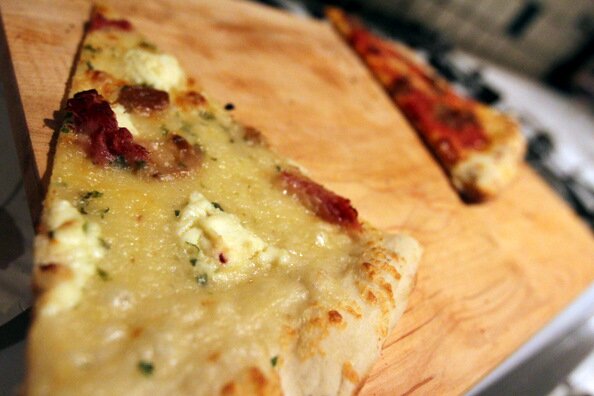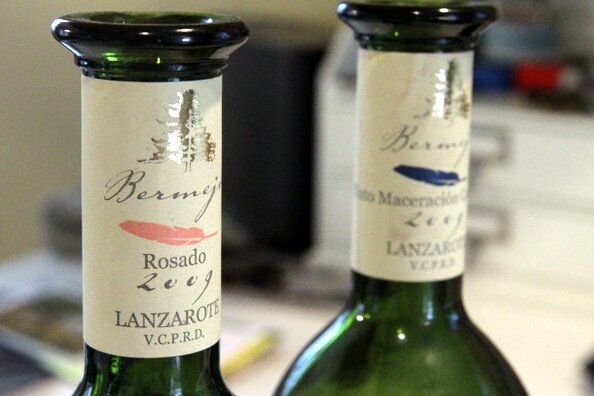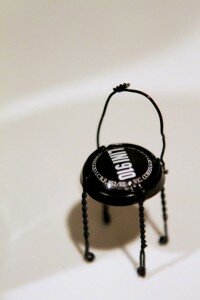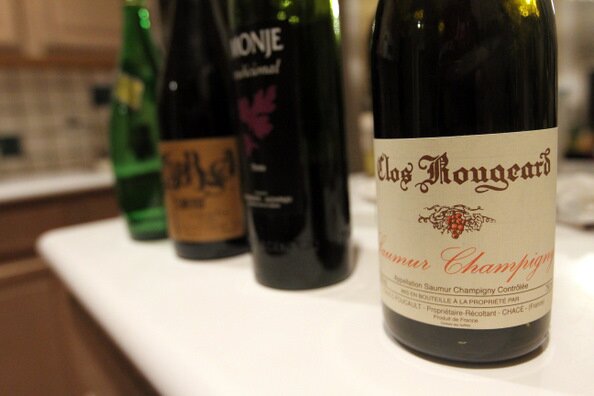Our sincere apologies, but no results were found for the requested archive. Todd probably had one too many Manhattans and ate the post you were looking for.

Tag Archives: jura
NOT FOUND
A Taste or Two. Or Twenty Four.

Much like the moon, my drinking habits have certain predictable phases. Coffee in the mornings. Tea in the afternoons. Cocktails for a few weeknights, wine for a few weeknights, beer for sports weekends or long nights out around Detroit.
This past week was a wine week. A phase. A big phase.
Starting with an opportunity to eat and drink a bit at Cork Wine Pub with some fellow GU Detroiters — James Cadariu, Steve Kirsch, Michael Lindberg, and Jarred Gild among them — and Louis/Dressner wine rep, Josefa Concannon, this wine phase of mine got off to a delicious start on Wednesday the 30th. Jeffrey Mar at Cork does a nice job rotating wines through on the list, keeping things interesting: We had newer Chablis (09 Seguinot-Bordet), Sancerre, and a couple of reds. It wasn’t the right place or atmosphere for taking notes, so I didn’t really get many, but one of the highlights on which I do have some notes is the 07 Mondeuse from Franck Peillot, which has been a staple of Jeff’s wine list since Cork opened.
2007 Peillot Mondeuse, Bugey, France
Imported by Louis/Dressner
Over email, there was some discussion among the GUD group regarding food and wine prompted in part by an article from Eric Asimov regarding his views on the subject. This wine is a perfect illustration of many of our conversational points: It’s delicious on its own, but there’s something transformative that happens with food. Loaded with mild, prickly tannins, this is bone dry on the finish, and there’s something about the way the tannins give way with food that opens up the bright, fleshy berry flavors and herbal flavors in this wine. This is impossibly dense and flavorful given its low alcohol content. Delicious stuff. Mondeuse is uncommonly seen in the US, but it’s gained a cult following through the efforts of importers like Dressner and places like Cork and Western that sell those wines. I dig.

Thursday, I snagged some carryout from Supino on the way home from work, and Jarred, James, Josefa, and I were joined by Kim and George at Gang of Pour. We drank bits and pieces of more than a dozen bottles, with delicious wines from the Canary Islands courtesy of Western Market and high expectations fulfilled by an older Muscadet and some 2003 Clos Rougeard.
2002 Luneau-Pepin L d’Or Cuvee Medaillee, Muscadet, France
Imported by Louis/Dressner
One of the things that surprises people as they become more interested in wine is that some white wines can age. Even more surprising is that inexpensive whites from regions a lot of people have never heard of can age. Because of the acid, good Muscadet is no different, and this is damn good Muscadet. (Thanks to Kim and George for sharing!) The nose on these wines always seem tight – almost like you’re trying to smell it on a rainy day when only the moisture and humidity really make its way into your nose. Here, its just a stone cold aroma of minerals and maybe a bit of citrus peel. It’s fleeting though. On the palate, this has the weight one would expect from being aged by the winemaker sur lie (i.e., aged on settled yeast and fermentation byproducts). It’s hard to believe this is a 2002 as it’s quite vivid and alive — plenty of citrus, acid, and minerality with a grassy, rainy quality that hangs on the tongue and gets cleaned up by a finish with tons and tons of acid.
2008 Zdjelarevic Grasevina, Slavonija, Croatia
James was kind enough bring to our gathering another of his Eastern European treasures acquired on his trip last year. There’s a long pause after everyone inhales the downright tropical aromas and takes the first sip. Everyone concurs that this wine is unlike just about anything we’ve had before. The nose is overflowing with honey, melon, maybe even mango aromas. It’s more powerful than layered, but it’s nonetheless enticing. On the palate, it initially seemed sweet and kind of boring. The more I drank it, the more I could taste all sorts of fruits and herbs — pear, orange, melon, lemongrass. It doesn’t have a long-lasting, powerful finish of any sort, but this was memorable and unique among wines to which I’ve been exposed in my life.
2007 Catherine & Claude Marechal Bourgogne Rouge
Imported by Louis/Dressner
This producer makes one of the best values in all of wine, and this is it. Locals can find it at Western Market. If you’re a fan of red burgundy, this is the best “everyday” option in the state since it’s so much more nuanced than you’d expect from an inexpensive wine. Raspberry and tart cherry up front and a beautiful, penetrating finish. It’s sexy but focused. Just great stuff.

2009 Bermejo Lanzarote, Canary Islands
Imported by Jose Pastor
There’s a method of fermenting wine known as carbonic maceration. In short, it involves fermenting the sugars while the juice is still inside the grapes rather than having crushed the grapes first. So whole grapes sit and ferment, and the resulting wine tends to be low in tannin and has a strong emphasis on fruit flavor. This particular example smells sweet, as one might expect, and while wines made by this method have never been my personal favorite, this is undoubtedly well made. It’s densely packed with flavors, and while the lack of tannic structure or acid isn’t my thing, it’s impossible not to be impressed with the soft, velvety texture. This is nothing like the plastic fakeness of industrial Beaujolais (as opposed to real Beaujolais, which I love), which commonly undergoes carbonic maceration. This is real wine, and it was another new experience. After all, I’d never had wines from the Canary Islands, and the Listan Negro grape from which this is made is a new thing to me.
2009 Bermejo Lanzarote Rosado, Canary Islands
Imported by Jose Pastor
The same producer and same importer and same retailer brought this delightful rose wine to my table that evening. It pours just a bit orange and reeks of flowers and berries. Fruit dominates the palate with some hints of stone and herbs, but this is fundamentally a dry wine. Most importantly, it is the very definition of quaffable. Fun stuff and perfect for what appears to be the forthcoming warm weather.
 Lini “Labrusca” Lambrusco Rosso, Italy
Lini “Labrusca” Lambrusco Rosso, Italy
Imported by Domenico Valentino
Prickly and dry, this is crazy good. Berries, herbs, bubbles. It’s not a tense or angry wine, but it strikes me as more serious than the bubbles and label might indicate initially. This has been available in the Detroit market for several months, and it made its unofficial debut at the Home Slice event at Eastern Market last fall. Jarred at Western carries this as well as the white and rose versions, all of which are delicious.
2003 Clos Rougeard, Saumur-Champigny, France
Imported by Louis/Dressner
Josefa, a representative of the importer for this wine, explained that all of these wines spend two years in the barrel and two years in the bottle before being released to the market. I bought this in 2007, 4 years after the vintage date and upon its release, from Putnam Weekley at the old Cloverleaf market. It’s been in the cellar, and it was drinking like a rock star wine that night. This is the type of wine that has led us to absurd tasting notes: It’s SO complex and SO layered that people like me want to describe every crazy flavor in the glass. I’m mellowing, so I’ll avoid a treatise on a single bottle. But in general, this has everything going on: There’s definitely some black fruit here, but it has a much more masculine, animalistic flavor with a perfect, elegant balance of acid, tannin, and fruit. This is what I want out of wines in middle and upper tier price points. One could sit there and smell this for a half hour and then spend all night with this bottle, just loving every minute of it.

After a high degree of interest from the GUD discussion group in an introductory community wine tasting, Jarred and I met with some other folks to (a) discuss how we might put something like that together and (b) drink some more great wines. Among the highlights…
2008 Jean Francois Ganevat Cuvee Julien, Jura, France
Imported by Jeffrey Alpert
This particular wine from Ganevat, purchased from Chambers Street Wine in New York, is exclusively Pinot Noir. With far more minerality and light, playful edginess to it than most burgundy but with more funk and earth than many Jura wines, this does a nice job of bridging those two worlds. Sour cherries, chalk, tannins… it’s all there. Light bodied and really very easy to drink. While it was tasty now, I think the acid, tannin, and fruit are all in such high concentrations that this would last some time in a cellar.
2008 Domaine Montchovet Hautes Cotes de Beaune, Burgundy, France
Imported by Jenny & Francois
Chardonnay is often referred to as the winemaker’s grape since it’s fairly malleable in terms of flavor — it can convey mineral and terroir in a minimalistic winery and it can coat one’s tongue with tropical fruit and vanilla in a New World paradise. But this fits no paradigms, no expectations that anyone could possibly have of white burgundy. All the elements are there, but the sum of those parts is something unique. Citric as though it were some bracing Loire Valley wine, it smells of lemon. And oak is certainly there, but so are peachy, fleshy fruits. Together, it’s a powerful shot of flavor. It’s not something I’d call a drinking, quaffing, cocktail style wine, but it’s interesting and requires your attention. Another wine I suspect you can only/most easily find at Western Market around here…

That’s it. Those are the highlights of the last ten days. In that time, I’ve more than filled my recycling bin with two dozen empties.
What, oh what, will the neighbors think?